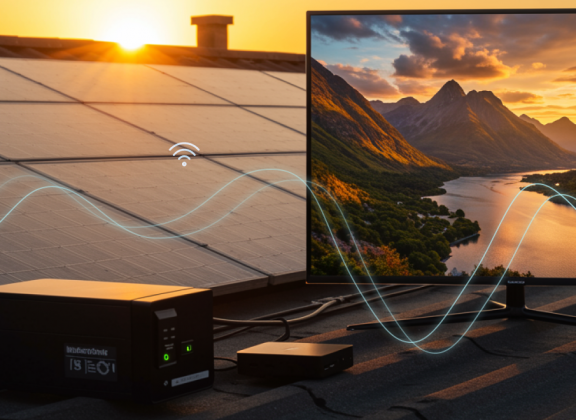In a world where streaming has overtaken traditional broadcasting, IPTV has become a cornerstone of home entertainment. It delivers live TV, on-demand content, and ultra-high-definition streams with ease. Yet, one simple reality can disrupt this seamless experience: a power outage. Whether caused by severe weather, grid maintenance, or unexpected technical failures, losing electricity can instantly take your IPTV system offline. Fortunately, modern backup energy technologies—specifically uninterruptible power supplies (UPS) and solar power systems—make it possible to stay connected even when the grid goes dark.
Assessing the Energy Profile of an IPTV Setup
An IPTV configuration typically includes a set-top box or streaming media player, a display device such as a television or monitor, and a network connection through a router or modem. In more complex setups, there may also be network switches or signal extenders. Compared to large appliances, the energy draw of this equipment is minimal—often in the range of 30 to 150 watts. This relatively low demand makes it an ideal candidate for backup power arrangements.
The challenge lies in matching your backup system’s capacity to your viewing needs. If your goal is to cover only brief outages lasting less than an hour, you will require far less stored energy than someone planning for multi-hour blackouts. Calculating wattage requirements and desired runtime is the essential first step in designing a reliable off-grid or backup solution for IPTV.
The Role of a UPS in IPTV Continuity
A UPS is the quickest and most convenient way to maintain IPTV operation during sudden power cuts. Acting as a buffer between your devices and the grid, it instantly switches to battery power the moment the main supply fails. This seamless transition means your stream continues without interruption or reboot delays.
Choosing the right UPS involves more than looking at its advertised capacity. Key factors include battery technology, inverter efficiency, and load tolerance. For IPTV, line-interactive or online double-conversion UPS units tend to offer superior protection, not only powering your devices but also regulating voltage and filtering harmful surges.
Battery capacity—measured in watt-hours or volt-ampere-hours—determines how long your system can run. A compact 1000VA UPS may keep a small IPTV setup running for one to three hours, depending on load and battery condition. For professional environments, larger rack-mounted units with additional battery packs can extend runtime significantly, ensuring uninterrupted service even through extended outages.
Solar Power as a Sustainable Backup
While UPS units excel at handling short-term interruptions, solar energy systems are the ultimate solution for long-duration outages. A properly designed solar installation can keep your IPTV and networking hardware powered indefinitely, provided there is sufficient sunlight to recharge the batteries.
At the heart of this setup are photovoltaic panels, which generate electricity from sunlight and feed it into a storage battery bank. This stored energy is then converted to AC power by an inverter, ready for use by your IPTV devices. To size the system correctly, you need to account for both the real-time consumption during daylight hours and the stored energy required for nighttime operation.
For example, if your IPTV system consumes 80 watts and you plan to watch for six hours after sunset, you will need a battery bank capable of holding at least 480 watt-hours, plus additional reserve to avoid deep discharges. An appropriately sized solar array should not only replenish this reserve but also run your devices during the day.
Efficiency is key. MPPT charge controllers ensure your panels deliver maximum power output under varying light conditions. Pairing them with modern lithium iron phosphate (LiFePO₄) batteries provides a stable voltage supply, rapid charging capability, and thousands of cycles of reliable operation.
A Hybrid Approach for True Energy Independence
In many cases, combining a UPS with a solar system yields the most resilient solution. The UPS guarantees instant protection against sudden blackouts, while the solar array supplies ongoing energy to recharge batteries and extend runtime indefinitely. This combination eliminates the downtime associated with purely battery-based systems and offers independence from fuel-based generators.
For households with infrequent power interruptions, a small UPS may be sufficient on its own. In areas where outages are frequent and prolonged, pairing UPS and solar ensures uninterrupted IPTV access, reduced reliance on the grid, and lower long-term operating costs. It also adds an element of environmental responsibility, cutting emissions while maintaining connectivity.
By integrating backup power strategies into your IPTV setup, you can ensure uninterrupted entertainment and information access under any circumstances. A UPS provides the fastest and most seamless response to outages, while solar energy delivers sustainable, long-term autonomy. When properly matched to your system’s needs, these solutions transform your IPTV experience from grid-dependent to self-sufficient, giving you not just uninterrupted viewing but the peace of mind that comes with true energy resilience.
